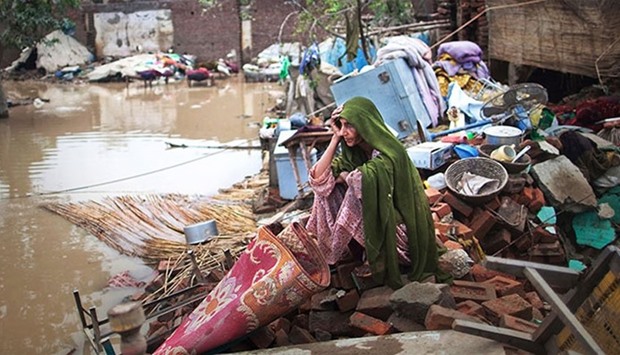Children and women are becoming more vulnerable as tens of thousands of people suffer from infectious and water-borne diseases in flood-hit Pakistan, government data showed and Unicef said yesterday, as the total death toll from the inundation surpassed 1,500.
As flood waters begin to drain away, which officials say may take two to six months in different areas, the flooded regions have become infested with diseases including malaria, dengue fever, diarrhoea and skin problems, the southern Sindh provincial government said in a report issued yesterday.
“Stagnant water is giving rise to the water-borne diseases,” Prime Minister Shehbaz Sharif said in his address to the Shanghai Co-operation Organisation (SCO) summit being held in Samarkand in Uzbekistan.
“Children getting malaria and diarrhoea...all kinds of diseases,” he said, adding, “millions of people are living under open sky.”
Women and children in poor health and/or malnourished are particularly vulnerable to any diseases.
The Sindh report said more than 90,000 people were treated on Thursday alone in the province, which has been the hardest hit by the cataclysmic floods.
It confirmed 588 malaria cases with another 10,604 suspected cases, in addition to the 17,977 diarrhoea and 20,064 skin disease cases reported on Thursday.
A total of 2.3mn patients have been treated since July 1 in the field and mobile hospitals set up in the flooded region.
Record monsoon rains in south and southwest Pakistan and glacial melt in northern areas triggered the flooding that has impacted nearly 33mn people in the South Asian nation of 220mn, sweeping away homes, crops, bridges, roads and livestock in damages estimated at $30bn.
The losses will slash the country’s GDP growth to around 3% from the estimated target of 5% set out in the budget at a time when it had narrowly escaped defaulting on its debt amid a balance of payment crisis.
Pakistan was already reeling from economic blows when the floods hit, with its foreign reserves falling to as low as one month’s worth of imports and its current account deficit widening.
The economy has yet to show any positive response to Islamabad resuming an IMF programme that had been delayed since early this year.
The National Disaster Management Authority has reported 1,508 deaths due to the floods so far, including 536 children and 308 women.
Hundreds of thousands of people who have been displaced are in dire need of food, shelter, clean drinking water, toilets and medicines.
Many have been sleeping in the open by the side of elevated highways.

(File photo)
